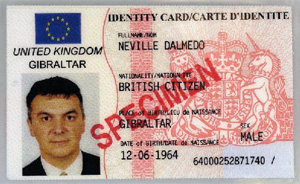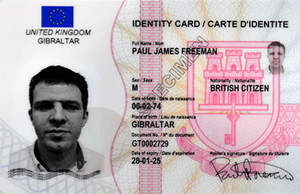Gibraltar has operated an identity card system
since 1943. The cards issued were originally folded cardboard, similar to
the wartime UK Identity cards abolished in 1950. There were different
colours for British and non-British residents.
When the EU introduced its common format requirements for ID cards, Gibraltar
modified its own existing ID cards to bring them into line with EU
requirements, replacing the old cards with a modern laminated card with
security features. On 15 May 1995, the United Kingdom Government informed
the Commission and the other Member States that Gibraltarís identity
card was to be considered as valid under the terms of Directives
related to the right to travel and to reside of workers,
self-employed persons, tourists, retired persons, economically
inactive persons and students.
In accordance with the Gibraltar Civilians Registration (Amendment)
Ordinance 1993, the only two categories of persons eligible to hold
Gibraltar identity cards valid for travel in the EU/EEA under the
terms of the United Kingdom notification of 1995 are British
Dependent Territories Citizens by virtue of a connection with
Gibraltar and British citizens resident in Gibraltar. All British
Dependent Territories Citizens by Virtue of a connection with
Gibraltar are considered United Kingdom nationals for all European
Community purposes pursuant to Council Declaration of 1983. The
Commission has accepted the Gibraltar Identity Card as a document
valid both for travel and residence purposes under the terms of EU
Law.
Although these cards were accepted by the United Kingdom and Sweden,
Spain refused to honour them, which caused problems at the frontier.
Despite their official validity, customs at the point of entry were
not familiar with British Citizens holding ID cards and there were
problems with acceptance.
In April 2000 an agreement was reached whereby with some minor changes
in the format of the card, Spain would accept Gibraltar ID card. However
ONLY the pink cards issued are valid internationally. Blue ones held
by British and other EU nationals living in Gibraltar and cards issued
to non-EU nationals are not valid for travel purposes.
The Gibraltar ID card is a minimal solution and is of practical benefit
to its users. The card is issued free of charge, with a five pound charge
for a replacement if lost.
 Despite having sophisticated security features,
because the format is a laminated card, and it is not familiar to the UK borders agency
and others, sometimes there has been confusion on its validity.
Despite having sophisticated security features,
because the format is a laminated card, and it is not familiar to the UK borders agency
and others, sometimes there has been confusion on its validity.
Similarly Gibraltar students have had trouble using it for 'proof of age' in the
UK despite it being an official Government document.
In Gibraltar the card is well known and accepted as proof of identity. All
Gibraltar residents are required to hold an ID card, but there is no requirement to
carry it. Pink cards are issued to Gibraltarians and permenant residents of Gibraltar.
Blue cards to other EU nationals, and yellow cards to non-EU nationals. Only the pink
cards are valid as a travel document.
In contrast, the British national identity card introduced under the
Identity Cards Act 2006, is another thing altogether. This multi-billion
pound scheme has yet to enter procurement. The cards will have a lesser
role than the database they are linked to, which will be known as the
National Identity Register (NIR).
The Act specifies fifty categories of information that the NIR can hold
on each citizen, including up to 10 fingerprints, digitised facial
scan and iris scan, current and past UK and overseas places of
residence of all residents of the UK throughout their lives and
indexes to other Government databases - which would allow them to
be connected. The legislation also says that any further information
can be added.
Critics of the scheme say it isn't just about identity cards. The
UK government's identity scheme is really a huge database to keep
tabs on everyone, with a massive infrastructure to collect peoples'
details, and a giant network of technology required to verify people
against their cards and both of these against the database.
The card is just the tip of the iceberg and estimated cost for a
passport and ID card of 77 Pounds, however the true cost every
taxpayer at least 200 Pounds. All that is based on current estimates
of the cost, and most government IT projects go over budget.
The legislation further says that those renewing or applying for
passports must be entered on to the NIR. It is expected that this
will happen soon after the UK Passport Service, which has now
been renamed the Identity and Passport Service (IPS), start
interviewing passport applicants to verify their identity. Concern
about the scheme have been expressed by human rights lawyers,
activists, security professionals, IT experts and both the opposition
Conservative Party, and the LibDems.
March 12, 2007 In an effort to recoup some of the estimated GBP 540 million
a year it will cost to run the UK's government ID database,
Members of Parliament (MPs) want to charge companies to verify
information with the database. Businesses would require citizens'
consent to access their information in the database. Citizens have
already expressed displeasure with the fact they have to pay GBP 93
for the cards, which hold 49 separate pieces of personal data.
MPs want to charge businesses 60p for each ID check. The
companies would submit data to the system and be given a "yes" or "no"
answer for verification purposes.
December 22nd, 2010 UK issued identity cards are to be officially abolished,
after peers finally withdrew their demand that the 12,000 people who paid £30 for them
should be allowed to claim their money back. The coalition's Identity Documents Bill,
which repeals the previous Labour administration's Identity Cards Act 2006, gained Royal Assent
to become law last night before the Commons rose for the Christmas
recess.
January 21st, 2011 Under the terms of the Act UK issued identity cards
ceased to be legal documents. The National Identity Register will be destroyed by
21 February 2011.
Gibraltar issued ID cards remain valid
New Gibraltar cards issued
May 12th, 2015 Her Majestyís Government of Gibraltar announced the launch of the new
Gibraltar Electronic Identity Card. This new e-ID Card is validated as a travel document which
will be recognised at points of entry throughout the EEA, eliminating problems previously
experienced by some carriers of the current Gibraltar ID cards at certain points of entry
within EU Member States.
 Announcing the
card the Government said "With its many enhanced security features, the e-ID Card will form
the backbone of HM Governmentís e-Gov initiative and, once the e-ID Card has been widely issued,
holders will have the security to access the many e-Gov services which are being planned.
Announcing the
card the Government said "With its many enhanced security features, the e-ID Card will form
the backbone of HM Governmentís e-Gov initiative and, once the e-ID Card has been widely issued,
holders will have the security to access the many e-Gov services which are being planned.
For example, in the near future, the new card provide the necessary security to enable
card-holders to complete their tax returns on line. The first e-ID cards will be issued at
the end of June."
As with the previous issue, pink cards are issued to Gibraltarians and permenant residents of
Gibraltar. EU nationals ordinarily resident receive blue cards and non EU nationals yellow ones.
Only the pink cards are valid as a travel document.
The card contains a RFID chip.


 Home
Home